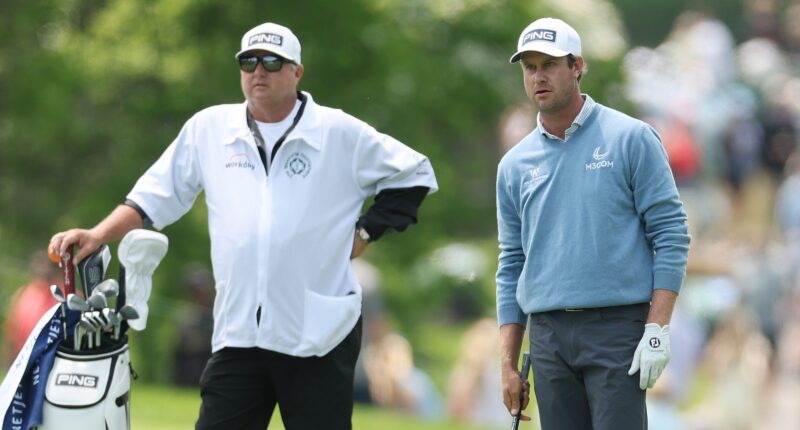
Getty
Harris English of the United States prepares to play a shot on the first hole during the third round of the Memorial Tournament presented by Workday 2025 at Muirfield Village Golf Club on May 31.
Harris English arrived in the United Kingdom this week, poised to start both the Genesis Scottish Open and The Open Championship–two pivotal events on his calendar. However, his longtime caddie and friend, Eric Larson, was denied entry due to a decades-old drug conviction. Under the new UK Electronic Travel Authority (ETA) rules, any individual who has served 12 months or more in prison, even if it happened 30 years ago, is ineligible.
Larson served over 10 years in prison for distributing cocaine in the mid-1990s and was released in 2006. Despite turning his life around and rebuilding his reputation in the world of pro golf, Larson’s past has resurfaced, jeopardizing his ability to continue caddying for English abroad.
“I guess the United Kingdom doesn’t look highly on his past,” English said. “And apparently it’s a work in progress.”
Reflecting on his past mistakes, Larson spoke candidly about the circumstances that led to his conviction:
“I did it for monetary purposes only. I didn’t use it, and I never brought it out on Tour,” Larson said. “Was I a major drug dealer? No. Did I drive fancy cars? No. That doesn’t make it any better.”
A Caddie-Player Bond Tested
The pair have forged a deep connection through tournaments and pivotal moments, including multiple Majors. Their bond transcends mere professional affiliation.
English learned of Larson’s visa issue only three weeks ago, after finishing T4 at the Travelers Championship. Since then, he’s thrown every resource he could muster, wire-tapping officials, lobbying UK Ambassador Warren Stephens, and enlisting letters of advocacy from the R&A, PGA Tour, and a charity Larson works with–to support Larson’s cause.
“I think it could be sitting on someone’s desk at the government somewhere,” English said.
“It’s just a matter of the right people seeing it. I didn’t understand how complicated the process was. Someone could see this guy had something in his past 30 years ago, he’s been fine the last 20. How long does this stay with him?”
With Larson grounded at home, English drafted Joe Etter, a familiar figure in his camp, to step in at the Scottish Open. But Etter is now expected to return to caddying for Davis Thompson at Royal Portrush.
“Joe was my Plan B,” English said. “Now we’re going to have to get a new Plan B,” English said. This late shuffle could affect performance, especially considering how much trust and rhythm exists between a player and caddie.
Redemption vs. Regulation
Larson’s story is one of redemption, but it has collided with immigration policy that offers little room for nuance. The new UK ETA regime aims to tighten rules, yet doesn’t weigh how applicants have rehabilitated or contributed positively in subsequent decades.
Larson’s transformation is significant: after his release, he immediately returned to golf. He was hired by Mark Calcavecchia and later caddied for players like Anthony Kim and Jeff Overton, building trust and respect across the tour.
His case begs the question: should regulations allow rehabilitated individuals a path to entry? The rigidity of the rules neglects personal growth and ignores how past mistakes have been corrected.
As of now, Larson’s case reportedly awaits governmental review, possibly languishing on someone’s desk. English remains hopeful, driven by the conviction that character and change should be weighed as heavily as past convictions.
“I just want to get to the British Open to help Harris…,” Larson said. “Everything has been tight-lipped. Everybody is frustrated.”
If he is able to secure an exemption, their reunion on UK soil would underscore how personal redemption can triumph at the highest levels. If not, English may be forced to continue major tournaments with a revolving cast.
Alyssa Polczynski Alyssa Polczynski is a multimedia journalist covering Major League Baseball for Heavy.com. She has experience as an editorial producer for MLB.com and contributed to the Society for American Baseball Research (SABR). More about Alyssa Polczynski
More Heavy on Golf
Loading more stories








